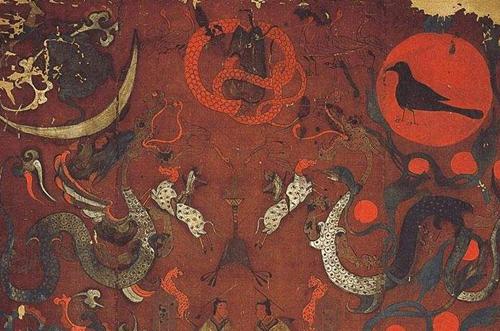
The Mawangdui Han Tomb is one of the major discoveries in the history of Chinese archaeology and is also a Well-known Han Dynasty tomb. Since 1972, this Han tomb, where the Han Dynasty Changsha State Minister Li Cang, Mrs. Xin Chai, and their sons are buried, has gradually been excavated, including countless ancient precious cultural relics, which have opened the eyes of the world.
One of the most precious artifacts is Madame Xin Chai herself, known as the "Sleeping Beauty of the East", the best-preserved wet corpse in the world. In addition, Mawangdui has also unearthed countless treasures, including the famous plain yarn cicada clothes, T-shaped paintings, as well as countless lacquerware, bamboo wood ware, silk fabrics, seals, bamboo Jane and so on.
These artifacts were unearthed and sent for research. And the authentic ancient tombs prove to us that the records in the correct history will also be wrong. For example, the words engraved on the seal of Cheng Xiangli cang have some discrepancies with the Hanshu written by Sima Qian and the Book of Han written by Ban Gu.
In addition to the seals, a batch of bamboo janes found in Mawangdui also seems to indicate this phenomenon, which has aroused people's doubts about the writing of the canonical history. It turned out that many of the contents on this batch of bamboo books were highly consistent with the "Bamboo Book Chronicle". The "Bamboo Book Chronicle" is an ancient historical material known for subverting historical impressions.
The person who wrote the Bamboo Book Chronicle was a historian of the Jin State during the Spring and Autumn Period and a historian of the State of Wei during the Warring States Period. Taking time as a clue, the Bamboo Book Chronicle records the history of the pre-Qin period in 1847, including Xia, Shang, Zhou, Spring and Autumn, and the Warring States, which ended in the wei xiangwang period. And this book was discovered by a tomb robber from the tomb of King Xiang of Wei in 279 AD.
The ancient book materials of the Mawangdui Han Tomb are highly overlapping with the "Bamboo Book Chronicle", which seems to further corroborate the authenticity of the "Bamboo Book Chronicle". But the problem is that the content recorded above in the Bamboo Book Chronicle is too different from the historical events we are accustomed to hearing. For example, we know that in ancient times, Yao once gave the Zen position to Shun, and Shun gave the Zen position to Dayu.
However, the Bamboo Book Chronicle says: "Xi Yaode declined, and was imprisoned by Shun." Meaning, Yao's prestige was slowly suppressed by Shun, and Shun found an opportunity to imprison Yao and seize the position of leader. Yao, Shun, Yu, and Tang are the four great sages of the ancients, and if the process of power change between them is no different from that of later generations, then wouldn't the "sages" promoted by Confucianism become a historical deception?
We have always thought that in that ancient era 4,000 years ago, it was rich in sages and sages, so there was a "Zen concession system". This is also the "ancient ritual" that Confucian culture has always respected, Confucianism advocates "nature is good", and legalists advocate "nature is evil", but the "Bamboo Book Chronicle" also records the story of Yi Yin and Taijia during the Shang Dynasty.
In the history of zhengyi, Yi Yin was a famous sage of the Shang Dynasty, because the emperor Taijia was not virtuous, YiYin exiled him for three years, and after Taijia corrected him, Yiyin took him back to continue to be the king and assisted him wholeheartedly. However, the "Bamboo Book Chronicle" says that Taijia was bullied by Yi Yin and forced to flee, and later quietly returned to China and killed Yi Yin to seize the throne. History is like a fog, full of doubts, do you think that the "Bamboo Book Chronicle" records are credible, or the "Records of History" and "Book of Han" are credible?